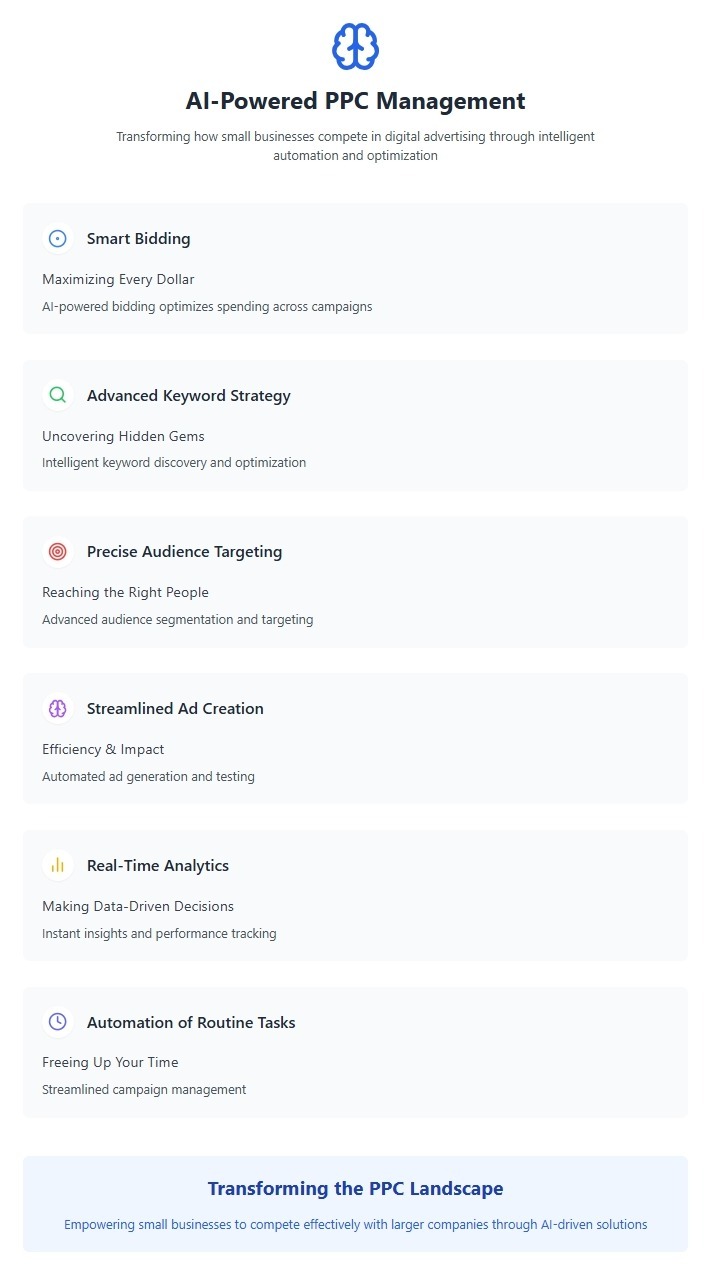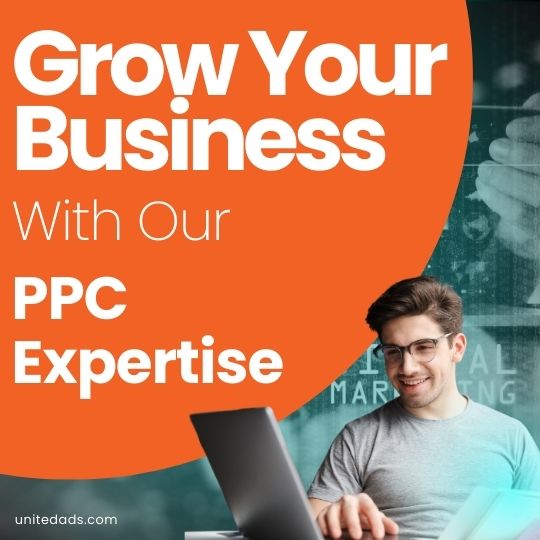About the Author
Alex is Founder & Strategic Advisor at UnitedAds, a leading digital marketing agency specializing in PPC Management.
With nearly two decades of industry experience, he has become a recognized authority in creating high-impact Google Ads campaigns that drive business growth.
Under his leadership, UnitedAds has built a strong reputation for delivering data-driven strategies that maximize ad performance and improve online visibility. Alex’s expertise lies in leveraging the full potential of PPC to help businesses scale efficiently and achieve sustainable success in the competitive digital marketing landscape.
Pay-Per-Click (PPC) advertising is a powerful tool for boosting website visibility and driving traffic. However, managing PPC campaigns can be complex and resource-intensive, especially for small businesses operating with limited budgets and staff. This is where artificial intelligence (AI) steps in, offering a transformative approach that’s reshaping how businesses of all sizes approach PPC.
By automating tasks, optimizing bidding strategies, and refining audience targeting, AI is leveling the playing field, empowering small businesses to compete effectively with larger companies in a cost-efficient and strategic manner. Here’s how small businesses can leverage AI to maximize their PPC campaigns and achieve significant impact in today’s competitive market.
1. Smart Bidding: Maximizing Every Dollar
One of the most significant advantages of AI in PPC is its ability to optimize ad bids in real-time. Traditionally, managing bids involved manually adjusting them based on factors like keyword performance, ad placement, and audience behavior. This approach, while effective, requires continuous monitoring and adjustments, which can be time-consuming and complex. AI, however, utilizes sophisticated machine learning algorithms to analyze vast amounts of data instantly, adjusting bids automatically to maximize returns and prevent overspending.
With AI-driven bidding, small businesses can set specific strategic goals – such as maximizing conversions, increasing click-through rates, or achieving a target cost-per-acquisition. By analyzing historical data and current campaign performance, AI systems determine the optimal bid for each ad placement, leading to more efficient spending and better overall results. This capability gives small businesses a crucial edge, allowing them to make every advertising dollar count and compete effectively with larger competitors who often have significantly bigger budgets.

2. Advanced Keyword Strategy: Uncovering Hidden Gems
Keyword selection is fundamental to PPC success, but finding the right keywords can be challenging. Small businesses often face an uphill battle, with popular keywords dominated by larger companies willing to pay a premium for top placements. AI helps to level the playing field by identifying less competitive, high-value keywords that might be overlooked and by predicting emerging keyword trends.
AI-powered tools utilize Natural Language Processing (NLP) to understand search intent and discover related terms that could attract relevant clicks. Armed with these insights, small businesses can develop targeted keyword strategies to reach their ideal audience without directly competing for high-cost, high-competition terms. AI also provides ongoing keyword recommendations, adapting to shifts in consumer behavior and ensuring your campaigns remain relevant. This adaptability and precision empower small businesses to maximize their reach and effectiveness without exceeding their budgets.
3. Precise Audience Targeting: Reaching the Right People
Understanding your audience is critical for any marketing campaign, but PPC advertising demands an even greater level of precision. AI-driven tools take audience targeting to the next level by analyzing a vast range of data points, including demographics, browsing behavior, interests, and even the time of day when users are most likely to engage with ads. By understanding audience preferences and behavior patterns, AI enables small businesses to target potential customers with greater accuracy and effectiveness.
AI-powered audience segmentation allows businesses to create more personalized ads, significantly increasing the chances of conversions. For example, a small retailer can use AI to identify potential customers who have previously shown interest in similar products, ensuring their ads are shown to those more likely to make a purchase. Furthermore, AI can dynamically adjust audience targeting based on real-time data, refining who sees the ads over time to improve engagement and reduce wasted impressions. This fine-tuned targeting allows small businesses to reach their ideal customers with precision, stretching their ad dollars further and increasing their return on investment.
4. Streamlined Ad Creation: Efficiency & Impact
Another area where AI offers significant advantages is in ad creation and testing. Traditionally, crafting effective ad copy and visuals involved extensive trial and error, with marketers testing different variations to identify what resonates best with their audience. AI simplifies this process by analyzing past ad performance and generating new ad variations tailored to specific audience segments.
Automated A/B testing powered by AI can simultaneously test multiple ad variations, gathering data on which elements most effectively drive engagement. AI then recommends adjustments or even creates new variations based on real-time performance. By streamlining the creative process and removing much of the guesswork, small businesses can develop impactful ads without needing extensive creative resources. AI-enabled ad creation tools save time and allow businesses to maintain a fresh, engaging presence in the PPC landscape without overworking their marketing teams.
5. Real-Time Analytics: Making Data-Driven Decisions
For small businesses, monitoring the effectiveness of PPC campaigns is crucial for making informed decisions and adjusting strategies accordingly. AI-powered analytics tools not only provide real-time data on key performance metrics like click-through rates, conversions, and cost-per-click, but also offer predictive insights based on historical data. This allows businesses to anticipate future performance trends and proactively adjust their campaigns.
Predictive analytics empowers small businesses to understand which times of day, days of the week, or even seasons are most likely to yield the best results. Armed with these insights, businesses can schedule ads for maximum impact, allocate budgets more effectively, and refine their approach to ensure continued success. AI’s ability to provide actionable insights means even small businesses can approach PPC with the sophistication and precision previously reserved for larger companies with dedicated data teams.
6. Automation of Routine Tasks: Freeing Up Your Time
PPC campaigns require constant monitoring, adjustments, and optimization, which can strain the limited resources of small businesses. AI helps to alleviate this burden by automating many routine tasks, freeing up time and allowing marketers to focus on higher-level strategy. Whether it’s setting and adjusting bids, identifying underperforming keywords, or generating reports, AI can handle these tasks efficiently, with minimal human intervention.
Automation ensures campaigns are continuously optimized, even outside of regular business hours. This allows small businesses to maintain competitive ad placements and engagement rates without requiring round-the-clock management. This level of automation is especially beneficial for small businesses, where team members often have multiple responsibilities and may lack the time or expertise to manage campaigns manually.
Transforming the PPC Landscape
AI is fundamentally transforming the PPC landscape, making it more accessible and affordable for small businesses to compete with larger players. By utilizing AI-powered tools for bidding, keyword selection, audience targeting, ad creation, and analytics, small businesses can streamline their PPC efforts, maximize their ad spend, and reach their ideal audience with greater precision.
As AI technology continues to evolve, the advantages for small businesses will only grow, providing even greater opportunities to make a significant impact in the digital advertising world. With AI, small businesses can truly level the playing field in PPC advertising, allowing them to achieve meaningful results, drive traffic, and grow their businesses in an increasingly competitive online environment.







